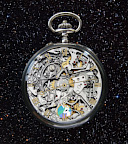The Best of All Possible Worlds: Power and Omnipotence · 5:40am Aug 26th, 2012
OOC:
Well, this was another long chapter, so I split it into two. Chapter 17 in particular forms the heart of this story.
I'd advise the reader not to proceed any further until they have read both chapters.
The essay "Power--Omnipotence", from the Philosophical Dictionary by Voltaire, is one of the most extraordinary things I have ever read. It is the only explanation of a universe containing both evil and God that I have ever been able to accept. And it is the primary inspiration for this story, because I felt that Celestia just had to hear it from him.
Here are some excerpts from this essay, from a 1901 translation by William F. Fleming:
I presume every reader of this article to be convinced that the world is formed with intelligence, and that a slight knowledge of astronomy and anatomy is sufficient to produce admiration of that universal and supreme intelligence. . . .
Can the reader of himself ascertain that this intelligence is omnipotent, that is to say, infinitely powerful? Has he the slightest notion of infinity, to enable him to comprehend the meaning and extent of almighty power?
The celebrated philosophic historian, David Hume, says, “A weight of ten ounces is raised in a balance by another weight; this other weight therefore is more than ten ounces; but no one can rationally infer that it must necessarily be a hundred weight.”
We may fairly and judiciously apply here the same argument. You acknowledge a supreme intelligence sufficiently powerful to form yourself, to preserve you for a limited time in life, to reward you and to punish you. Are you sufficiently acquainted with it to be able to demonstrate that it can do more than this? How can you prove by your reason that a being can do more than it has actually done?
The life of all animals is short. Could he make it longer? All animals are food for one another without exception; everything is born to be devoured. Could he form without destroying? You know not what his nature is. It is impossible, therefore, that you should know whether his nature may not have compelled him to do only the very things which he has done.
The globe on which we live is one vast field of destruction and carnage. Either the Supreme Being was able to make of it an eternal mode of enjoyment for all beings possessed of sensation, or He was not. If He was able and yet did not do it, you will undoubtedly tremble to pronounce or consider Him a maleficent being; but if He was unable to do so, do not tremble to regard Him as a power of very great extent indeed, but nevertheless circumscribed by His nature within certain limits.
Whether it be infinite or not, is not of any consequence to you. It is perfectly indifferent to a subject whether his sovereign possesses five hundred leagues of territory or five thousand; he is in either case neither more nor less a subject. Which would reflect most strongly on this great and ineffable Being: to say He made miserable beings because it was indispensable to do so; or that He made them merely because it was His will and pleasure?
Many sects represent Him as cruel; others, through fear of admitting the existence of a wicked Deity, are daring enough to deny His existence at all. Would it not be far preferable to say that probably the necessity of His own nature and that of things have determined everything?
The world is the theatre of moral and natural evil; this is too decidedly found and felt to be the case; and the “all is for the best” of Shaftesbury, Bolingbroke, and Pope, is nothing but the effusion of a mind devoted to eccentricity and paradox; in short, nothing but a dull jest.
The two principles of Zoroaster and Manes, so minutely investigated by Bayle, are a duller jest still. They are, as we have already observed, the two physicians of Molière, one of whom says to the other: “You excuse my emetics, and I will excuse your bleedings.” Manichæism is absurd; and that circumstance will account for its having had so many partisans.
. . .
Had I been Arimanes, I should have assailed Oromazes in his immense and noble provinces, comprehending numbers of suns and stars. I should never have been content to confine the war to an insignificant and miserable village. There certainly is a great deal of misery in this same village; but how can we possibly ascertain that it is not absolutely inevitable?
You are compelled to admit an intelligence diffused through the universe. But in the first place, do you absolutely know that this intelligence comprises a knowledge of the future? You have asserted a thousand times that it does; but you have never been able to prove it to me, or to comprehend it yourself. You cannot have any idea how any being can see what does not exist; well, the future does not exist, therefore no being can see it. You are reduced to the necessity of saying that he foresees it; but to foresee is only to conjecture.
Now a god who, according to your system, conjectures may be mistaken. He is, on your principles, really mistaken; for if he had foreseen that his enemy would poison all his works in this lower world, he would never have produced them; he would not have been accessory to the disgrace he sustains in being perpetually vanquished.
Secondly, . . .
In the third place, . . .
Fourth, it is not deprecating God to say that He could not form man without bestowing on him self-love; that this self-love could not be his guide without almost always leading him astray; that his passions are necessary, but at the same time noxious; that the continuation of the species cannot be accomplished without desires; that these desires cannot operate without exciting quarrels; and that these quarrels necessarily bring on wars, etc.
Fifth, on observing a part of the combinations of the vegetable, animal, and mineral kingdoms, and the porous nature of the earth, in every part so minutely pierced and drilled like a sieve, and from which exhalations constantly rise in immense profusion, what philosopher will be bold enough, what schoolman will be weak enough, decidedly to maintain that nature could possibly prevent the ravages of volcanoes, the intemperature of seasons, the rage of tempests, the poison of pestilence, or, in short, any of those scourges which afflict the world?
Sixth, a very great degree of power and skill are required to form lions who devour bulls, and to produce men who invent arms which destroy, by a single blow, not merely the life of bulls and lions, but — melancholy as the idea is — the life of one another. Great power is necessary to produce the spiders which spread their exquisitely fine threads and net-work to catch flies; but this power amounts not to omnipotence — it is not boundless power.
In the seventh place, if the Supreme Being had been infinitely powerful, no reason can be assigned why He should not have made creatures endowed with sensation infinitely happy; He has not in fact done so; therefore we ought to conclude that He could not do so.
Eighth, all the different sects of philosophers have struck on the rock of physical and moral evil. The only conclusion that can be securely reached is, that God, acting always for the best, has done the best that He was able to do.
Ninth, this necessity cuts off all difficulties and terminates all disputes. We have not the hardihood to say: “All is good”; we say: “There is no more evil than was absolutely inevitable.”
Tenth, why do some infants die at the mother’s breast? Why are others, after experiencing the first misfortune of being born, reserved for torments as lasting as their lives, which are at length ended by an appalling death? Why has the source of life been poisoned throughout the world since the discovery of America? Why, since the seventh century of the Christian era, has the smallpox swept away an eighth portion of the human species? Why, in every age of the world, have human bladders been liable to be converted into stone quarries? Why pestilence, and war, and famine, and the Inquisition? Consider the subject as carefully, as profoundly, as the powers of the mind will absolutely permit, you will find no other possible solution than that all is necessary.
I address myself here solely to philosophers, and not to divines. We know that faith is the clue to guide us through the labyrinth. We know full well that the fall of Adam and Eve, original sin, the vast power communicated to devils, the predilection entertained by the Supreme Being for the Jewish people, and the ceremony of baptism substituted for that of circumcision, are answers that clear up every difficulty. We have been here arguing only against Zoroaster, and not against the University of Coimbra, to whose decisions and doctrines, in all the articles of our work, we submit with all possible deference and faith. . . .






What gentle heresy this is. I feel educated.
A brilliant essay, and one that I have always admired from an intellectual standpoint. Even if that first sentence always does get a chuckle out of me, if only because that presumption is wrong in my case. Though, perhaps, it may have been meant to.
I wonder if this apparent presumption of his might have been different had he lived in an era after Darwin, Einstein and Oppenheimer, or Bohr and Heisenberg. Would he have remained convinced of a need for an intelligence the same way Newton (his hero) was? Would this conviction of an elegant universe hold him back from further progress in his field, the way it did Newton and Einstein? I wonder, indeed...
Still, a brilliant, thought provoking essay that should be read by everyone, regardless of their personal philosophy. Thank you for posting it for everyone to see.
I will say, though, that I would really, really, really like to get more glimpses of the author's interactions with Twi- I mean... the unnamed original author and her friends. That transcription of their reactions to olympic events had me rolling on the ground in tears.
Philosophy = mindfuck
understanding mindfuck at first read = abstract thinker/ asperger's syndrome
a.deviantart.net/avatars/l/y/lyramotherofgodplz.jpg
"tormentes"
Typo?
"Why has the source of life been poisoned throughout the world since the discovery of America?"
I think that's the most poetic reference to syphilis I've ever seen. Ah, Voltaire…
856560
And said typo has been fixed.
Heh. That second to last paragraph, not bad. Bladders turned to stone quarries.
I must remember that one.
You are compelled to admit an intelligence diffused through the universe
With the failure of the first premise for me, I can not really appreciate the rest of the argument.
If Voltaire submits this essay with little deference and faith, it was nonetheless the best that he was able to do.
But really, I liked the essay. I'm surprised it wasn't included in my courses.
A most interesting essay. This is an angle I haven't quite seen before, at least not one who admires the capability of a flawed diety rather than railing on its shortcomings.
I don't quite agree with Voltaire here, but the theology I believe in didn't come about for another 50 years after Voltaire's death, so I can't fault him on that. I don't wasn't to type up a full dissertation on mobile, but it basically says: "what if humans are here to experience mortal life and learn good from evil, and the evil of men and natural destruction are accounted for, and necessary for us to learn that truth?" I could word that better, but I hope you get the point.
So I know this blog is older than dirt, but Voltaire was basically saying that either God is all powerful, but allows for evil, and bad thing to happen to good people, which must mean God himself is wicked, or, he isn’t all powerful (and presumably lead him the the conclusion that God’s primary purpose was creating the universe, and not much else)? Or am I missing something?
5123738
Yes. God is powerful enough to create the universe, but not powerful to create a perfect universe. This is the best of all possible worlds, and God apologizes for the inconvenience.
5123984
Naw dude it’s okay. Honestly I’d rather this than have you explain the Rwandan Genocide and Holocaust.
1083627
Dear McPoodle,
So, I heard there was a new generation coming, and I thought I would finish off watching FiM, as for some reason I stopped watching around season 4.
After getting through season 2, I remembered a fanfic I really liked involving Voltaire.
I found it again and reread it. The story of the frogs drew me in more then I remembered. I saw the journal entry included a excerpt from Voltaire. It started with a presumption that use to turn me off of philosophy. It had seemed to my like most philosophy was an attempt at proving a Deity, except for Spinoza, I had dismissed them.
But I have evolved past that, at least to give Voltaire a listen to. Surely I was not one to let one or another of the other impossibilities in the story got in the way.
Reading this essay was fascinating. It helped expand the Frog Princess of Fomalhaut and my enjoyment of MLP:FiM. I had been troubled by the dichotomy of Princess Celestia's divinity and defeat.
After completing, I was compelled to the comments where I found one that made me laugh. Someone had also found the first line to be a turn off as well, and while I understood the argument, I also had enjoyed the article.
On one hand I completely understood this comment somepony had left nearly a decade ago, but I also understood how it was limiting. I felt cognitive dissonance, an Ouroboros in my mind encapsulating both sides at once. A rare experience.
Well, I had to reply to the distant poster, and looked to see what there name was.........
Oh.
It was me.
From 9 years ago.
I have eaten my own tale. My story is endless. Wow. I am looking back at myself through a mirror of time. I have changed and I am the same. A nine year posting loop on a sub-forum of a fan-fic about candy colored ponies.
I have since watched to season 8 and hope to finish Gen 1 soon. I had stopped because I was sad the the Princesses were not gods and somehow a new one had been created. If only I had read what I had dismissed, I would have understood the frogs and would have watched the rest of the wonderful seasons.
Lessen learned.
Wait! Are Breezes frogs?
Thinking of his theology got me to thinking of his ethical philosophy, and though Voltaire was famously not a fan of my people, we've long held more-or-less the position of Candide: this is not the best of all possible worlds, and so it's up to us to make it better through goodness to each other and ourselves.